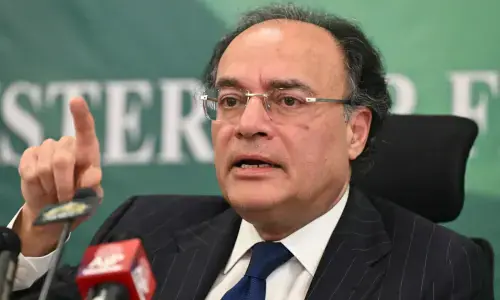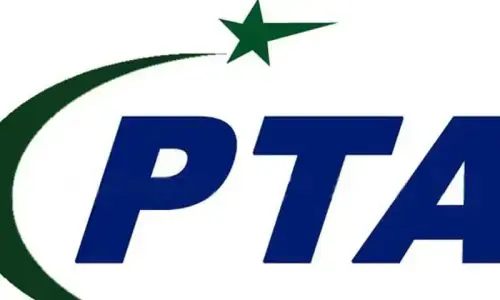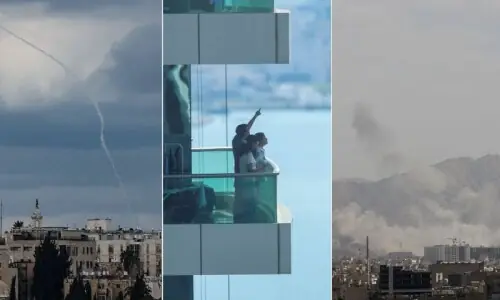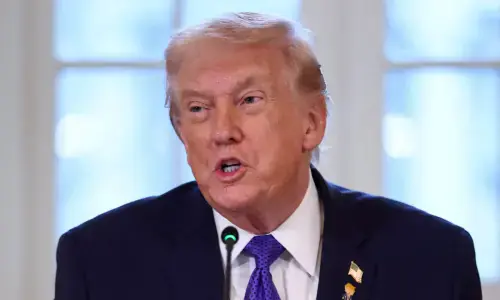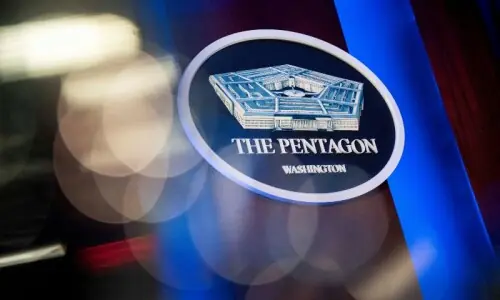 “Gwadar Port finally making history by beginning its cargo handling from March 15, 2008,” says a newspaper report.
“Gwadar Port finally making history by beginning its cargo handling from March 15, 2008,” says a newspaper report.
And the port is certainly making history. This is perhaps the first port in the annals of the history of port development which could not receive the first commercial ship specifically chartered to use the port on its inauguration. Somebody just forgot to check the draft of the ship against the depth available at the port. The ship had to be partially unloaded at the anchorage to MV Hyderabad, engaged from PNSC, before the ship was able to enter the port.
According to Singapore’s Business Times of March 27, David Yang of PSA, (the operator of the port), declared the arrival of this ship, Pos Glory, as “a significant milestone in the port’s successful start-up.” The operator had been handed over the $298 million port on January 23, 2007. It handled one commercial ship in 14 months of its operation: a real milestone indeed.
This is not the first time Gwadar has made history and/or has established milestones.
Pakistan’s dream of having a deep water port at Gwadar is nearly as old as its existence. It started with the recommendation of Worth Condrick who was deputed by the US for survey of the Balochistan coast in 1954.
Realising importance of Gwadar, Pakistan paid £3 million (some say half that sum) in September 1958 to buy back the enclave from the Sultanate of Oman ending over 200 years of Omani control. Since then the history of the decision making process for its development has been that of studying, planning, shelving, restudying, re-planning and waiting and hoping for some outside aid agency to finance the project.
This process has taken half a century before the dream has finally become a reality, though, not fully yet to achieve the avowed objectives. Leaving aside the distant past, even the last two decades are full of events in the life story of Gwadar that make interesting history.
* 1988-1992: A mini-port was built at a cost Rs1,623 million including the foreign exchange component of Belgian franks of 1,427 million, equivalent to Rs749 million, arranged by the contractor. No ship worth the name ever called at the port.
* 1992: Karachi Port Trust initiated the project for development of a deep water port at Gwadar at a cost of $200 million with KPT funding 60 per cent of the cost. The rest of the money was to have been raised externally. The port was to be constructed within two years.
* 1993: Gifford & Partners & Technecon of Southampton, UK, in association with Techno-Consult carried out a study to develop the port.
* 1993-1994: The transport plan of the 8th Five Year Plan of Pakistan included the development of the port as an essential element of its aims and objectives.
* 1994 (November): A policy package for development of the port was floated to attract private/foreign investors on a BOT basis. This had a poor response.
* 1995: The federal government approved the construction of the port in December 1995 but the project could not get started because of shortage of funds.
* 1997: The government of Prime Minister Nawaz Sharif appointed a task force with Captain Haleem Siddiqui as chairman to address ports and shipping issues. The task force identified Gwadar as one of the focus area of development. However, the project remained a non-starter due to the post-Chagai economic sanctions.
* May 1999: China offered to jumpstart construction of the port by offering financial and technical assistance. This, however, could not materialise because of some unknown reasons.
* May 2001: President General Pervez Musharraf personally took up the matter with Chinese PM Zhu Rongji during his visit to Beijing. The latter agreed to help Pakistan in implementing the project.
* October 2001: Chinese engineers prepared master plan for the port. The groundbreaking ceremony of the construction work was to take place by the end of 2001. It was delayed because of US led air strikes on Afghanistan in retaliation of the September 11 attack in the US. Speculation was, however, rife that the Chinese pulled out of the project because of the expected use of the area around Gwadar by the US as a logistics corridor into Afghanistan.
* March 11, 2002: A delegation led by Communications Secretary Iftikhar Rashid arrived in Beijing to sign the agreement to re-start the work.
Finally on March 22, 2002, the groundbreaking ceremony of the project was performed by the President of Pakistan, General Pervez Musharraf, and PRC Vice-Premier Wu Bang Guo. The port was to be completed by March 2005.
The Gwadar story then became the perfect classical example of a myriad of events developing into the following well-known four stages of a mismanaged project: (a) euphuism of start-up, (b) realisation of ground realities, (c) identification of scapegoats and, (d) correction of the course.
Start-up: The government started the drum beat by spreading the news that with the day and night efforts of the Chinese, the project would go into operation much earlier than expected. Finance Minister Shaukat Aziz said in May 2003 that the work at the port was proceeding ahead of schedule of March 2005.
In a briefing to newsmen on June 6, 2004, Gwadar Development Authority, Director General Mir Ahmad Baksh Lehri advanced the date of completing the project to January, 2005.
The concerned officials were even more hopeful during a meeting on August 20, 2004 that was attended by Prime Minister Chaudhry Shujaat Husain, Finance Minister Shaukat Aziz and the seven-member Chinese delegation led by Charge d’Affairs Song Deheng: “The first phase of the port would become functional by December 25, 2004.”
The euphuism of the project then slowly started disappearing. Numbers of press reports on the progress of the project started diminishing. Authorities started realising that there were many a slip between the cup and the lip.
Ground realities: As the date for the hopeful completion of the project (December 2004) was nearing, officials dropped the hint for the first time on September 15, 2004, that all was not going on well with the project. It started having shares of big and problems. The wishes began to be translated into realities. Most probably authorities forgot that for the port to be functional, it required suitable equipment for handling cargo; and boats and tugs for handling ships. It also required deepening of the navigation channel to a more suitable depth for respectable size of ships to enter the port.
Officials were then instructed by higher authorities to procure equipment and boats required for the port “from the Chinese without any further delay”. The deepening of the port’s navigation channel to 14.7 million was also instructed to be carried out. A specialist firm or a person was considered necessary for smooth execution and port operation. The cost was revised to $298 million from the original cost of $248 million. The project completion date was revised to September 2005.
The surprising thing, however, was that even the Chinese Assistant Minister of Commerce Chen Jian did not know of this position. Talking to the then Ports and Shipping Federal Minister Babar Khan Ghauri on October 21, 2004, he assured the Pakistan authorities that the Port would be ready for operation by December 18, 2004. There were, however, definite indications by now that the project would not be completed before December 2005, nine months behind the schedule and 12 months behind the hopeful schedule.
Scapegoats: Apparently the news of delays trickled down to the prime minister and the president. A policy board was formed to ensure development of the Port and the City as an integrated industrial and commercial hub. The president agreed to be the patron-in-chief of the proposed board with the Prime Minister as its head, assisted by a powerful coordination and implementation committee.
Rear Admiral (Retd) Sarfaraz Khan (TIM), Chairman of the Port Authority silently left from the scene and without much fun fare Mr Akbar Ali Pasani, a local Gwadarite was appointed in his place. However, it was not until April 28, 2006 that the real culprit responsible for the delay was declared. Speaking as chief guest at a meeting of Gwadar Builders Association in Taxila, Federal Minister for Labour, Manpower and Overseas Pakistanis said that, “Gwadar project could not be completed due to sabotage and terrorist acts.
Another explanation given earlier by a minister, who did not want to be identified, for the delay in the Port’s inauguration in March 2005 was “due to recent floods and rains that damaged some parts of the coastal highway linking Karachi with Gwadar”.
Correction: Naturally, the correction process started in earnest though at a crawling pace. China provided additional funds for immediate dredging of the channel and purchase of additional cargo handling equipment and floating craft.
Apparently, President General Pervez Musharraf was very upset over the slow progress. Chairing a high level meeting called to review progress on Gwadar development project at Army House in Rawalpindi on June 10, 2005, the president directed the concerned authorities to simultaneous complete the port and all related infrastructure facilities before June 2006.
Confirming the above new completion schedule date, the then Minister Ports and Shipping Babar Ghouri told the Senate on June 17, 2005 that the development work of the Gwadar port project would be completed by June 2006 and the inauguration would be held in a befitting manner after its completion.
It was also realised that the most important thing for operation of the port when completed will be the appointment of a suitable port operator. The GPA in an advertisement published in the print media on June 12/13, 2005 invited EoI and RFPs.
The appointment of the required port operator made yet another history on its own. It took more than one and a half year for this process to be completed. This happened only after a new tender committee was appointed. Thanks to this committee and its head, Farooq Rahmatullah that within a week of the submission of the bids on December 4, 2006, the winning bidder was declared on December 10, 2006. Following the recommendation of the tender committee, Prime Minister Shaukat Aziz finally approved, on January 23, 2007, the appointment of PSA for operation of the port.
Conclusion: To sum up, the port with its 36 month construction schedule beginning March 22, 2002, has taken the first commercial ship after 72 months, even that after partially unloading at the anchorage: A ‘history making’ event indeed and a ‘significant milestone,’ as the PSA declares.
Leaving aside the loss of revenues of $300 million investment due to delay of some three years in the operation of the port, the question now is: who will pay for the demurrage charges of the ship waiting at the anchorage, charter cost of second vessel MV Hyderabad and cost of partial unloading of cargo at the anchorage from one ship to another? The simple answer most probably will be: who else but the poor tax payer!
However, it is no use crying over spilt milk. Under the present system of multi-level control of such projects in which every one worth position in the government has a finger in the pie, you cannot make any one individual or, even any one organisation accountable for such errors and omissions. In this system, you give power of decision-making to some authority by one hand and take it back by the other to be exercised by so many. This is then what happens: when every thing goes smoothly, every one takes the credit; but when things go sour, you cannot find any one responsible.
Nevertheless, it is not too late to learn from the past mistakes. Let us wish the port management under the new leadership of Rear Admiral M Ehsan Saeed Godspeed in making up the deficiencies faced by the port to achieve the avowed objectives. Hopefully, the fate of the second phase of the port is not hanging in the air for long lest it keeps up with its name Gwadar which in the local language means “The Gate of Air”.
The author is a retired port, harbour and shipping consultant in Canada (Email: zrizvi@sympatico.ca)



